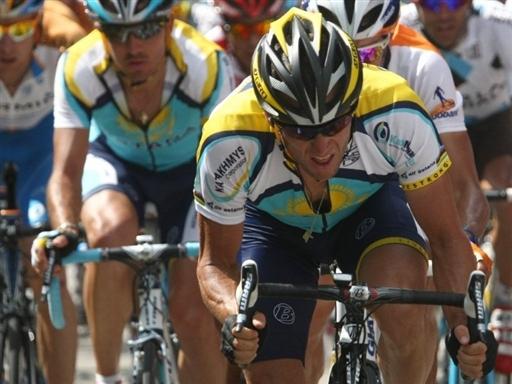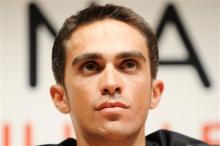Armstrong gains time on Contador, team dispels talk of rivalry
7-time winner was smart, lucky

Lance Armstrong (Astana) was arguably the only overall favourite to benefit from the crosswind-inspired attack mounted by all nine riders in the Columbia-HTC team with 32km remaining of Monday's third stage of the Tour de France. Despite speculation from the pundits, the Astana team insists Armstrong's gains on Alberto Contador were not taken due to a power struggle within the team
Contador was missing from the move, and the supposed team leader had been sitting second overall at the start of the day. Yet also absent from the front group were rivals Cadel Evans (Silence-Lotto) and the Schleck brothers (Saxo Bank), to name just three overall contenders.
And that, said Armstrong and manager Johan Bruyneel afterwards, explains why the two Astana riders in the front group, Yaroslav Popovych and Haimar Zubeldia, were sent to the front to assist the Columbia effort to distance the chasing group.
Bruyneel added that the presence in the front group of the yellow jersey, Fabian Cancellara, was another a factor in his tactics. "Strategically it would be a good situation for us if Cancellara could stay in the jersey," said the Astana director. "That would help us a lot in the days after [Tuesday's] team time trial."
Armstrong: Why wouldn't you ride at the front?
Yet the tactic inevitably raised eyebrows. Is it the first sign that Armstrong could usurp the Spaniard as team leader, if other situations favourable to the American arise? Are there echoes of 1986, when Bernard Hinault went back on his promise to help Greg LeMond by initiating attacks, and gaining time whenever he could, before eventually the young American prevailed?
Armstrong insisted not, and that he had merely been in the right place at the right time. "You know what the wind's doing, you see a turn [in the road is] coming, so it doesn't take a rocket scientist to figure out that you have to go to the front," he said at the finish.
Get The Leadout Newsletter
The latest race content, interviews, features, reviews and expert buying guides, direct to your inbox!
On Contador's absence, he noted: "That's not my objective, but generally I was surprised there was a split.
"I wasn't waiting [for the attack]," he added. "I was just trying to stay up front, out of trouble. [Columbia] were on the front, chasing the breakaway. It wasn't an attack: they turned, saw the wind and accelerated. It wasn't as if it was an ambush – they were already [at the front], so if anything it was an acceleration.
"We didn't ride for a long time, then at the end we put some guys on the front to ride, but the vast majority of the work was done by other people," Armstrong continued.
He then deviated a little from the line that he had merely been fortunate, and gave the clearest hint yet that he is here to try and win. "I've won the Tour de France seven times, why wouldn't you ride at the front? It makes no sense that you wouldn't ride there.
"It's good positioning, experience, a little bit of luck," he said of his ability to make the split. "Just before that corner I was twenty guys back and I just decided when I did to move up to be on that if it went.
"It was not a typical day. It had a lot of open areas with a lot of seafront. Those days, you've got to stay up the front."
After the stage, Contador was measured in his response to speculation that he had been 'flicked' by his own teammate.
"I do not want to assess the tactics of the team, everyone can form his own conclusions. The Tour is not going to be decided on what happened today, it is just another part of the race," he said, adding that his time loss was insignificant.
Split was "a surprise" says Bruyneel

"During the stage it became clear that it was not as dangerous as we thought; the wind was not exactly doing what we expected, and a lot of times when we changed direction [the road] was protected.
"But all of a sudden, at an unexpected moment, the bunch split and we had three guys up there. So first, we tried to see who was there, and apart from Lance [there was] no one from the other favourites. At first we let Columbia do the work with Skil-Shimano, who surprisingly had six riders there; and then we saw that all the other teams were pulling in the peloton.
"It was thirty seconds then it came down to eighteen and at that moment I was convinced the peloton was going to come back. So at that moment, with 10km to go, we decided it was a good moment for Popovych and Zubeldia to help at the front, first of all to make it hard on the other teams, and also, strategically for us, it would be a good situation if tomorrow, after the team time trial, Cancellara could stay in the jersey. That would help us a lot in the days after the team time trial.
"Sometimes things like that happen," added Bruyneel. "It was a surprise moment, [and it's] not normal that all the favourites are surprised. No one expected it. We were studying the map all day, and the wind direction was the opposite of what we expected all day, then, all of a sudden, it was there. Most were caught by surprise. It was definitely not a plan for us to be at front: it just happened."
Crunch time tomorrow in TTT
In moving up to third overall – and leapfrogging Contador – Armstrong rode himself into contention to take over the yellow jersey in Tuesday's team time trial, if he can overcome a forty-second deficit on Cancellara, not to mention the seven seconds on Tony Martin of Columbia-HTC.
"I think Saxo will be strong," said Armstrong of his yellow jersey prospects. "Cancellara was there [in the front group] and he has quite a few seconds. But never say never."
On the team time trial course, he added: "It's tough, technical. Unlike most team time trials we've done in the past, it's very complicated. We'll have to be more cohesive than we've been in the past, and very considerate of the seventh and eighth and ninth guy, not the fifth guy."
Armstrong seemed to imply again that as a seven-time winner he deserves to be regarded as an overall contender, admitting that his move up general classification "changes the dynamic for the team time trial."
"I'd prefer to stay out of the drama of who's the leader of the team. I've won the Tour seven times, I think I deserve a little bit of credit. But Alberto's a great rider too and we've got to go with the two leaders, but that doesn't mean you can't take advantage of opportunities like today."
"I'd prefer to stay out of the drama of who's the leader of the team. I've won the Tour seven times, I think I deserve a little bit of credit. But Alberto's a great rider too and we've got to go with the two leaders, but that doesn't mean you can't take advantage of opportunities like today."
-Armstrong on stage two's split
Richard Moore is a freelance journalist and author. His first book, In Search of Robert Millar (HarperSport), won Best Biography at the 2008 British Sports Book Awards. His second book, Heroes, Villains & Velodromes (HarperSport), was long-listed for the 2008 William Hill Sports Book of the Year. He writes on sport, specialising in cycling, and is a regular contributor to Cyclingnews, the Guardian, skyports.com, the Scotsman and Procycling magazine.
He is also a former racing cyclist who represented Scotland at the 1998 Commonwealth Games and Great Britain at the 1998 Tour de Langkawi
His next book, Slaying the Badger: LeMond, Hinault and the Greatest Ever Tour de France, will be published by Yellow Jersey in May 2011.
Another book, Sky’s the Limit: British Cycling’s Quest to Conquer the Tour de France, will also be published by HarperSport in June 2011.